Best Disc Golf Retrievers
Best Disc Golf Retrievers
One of the irritating aspects of disc golf is searching for lost discs. When a disc lands in thick grass, bushes, trees, reeds, water, or some unknown landing place, it can appear that discs sometimes disappear off the face of the earth. Even more frustrating is when we can see a disc, but can’t reach it. Whether it is in a pond, up a tree, over a fence, or in a thorny bush, the idea of leaving a disc behind is very difficult.
Enter the retriever. Disc golf retrievers can make the task of getting our wayward discs back into our bags much easier – and in some cases they are the only way to get a disc back. In this blog post we will compare the different types and brands of retrievers, and recommend the best ones for you.
For the sake of this blog, we will categorize retrievers into two categories: retrievers that use a pole or extension device, and retrievers that use a rope or cord. We can then break down those two categories and talk about the variations of those categories. Then we’ll see which retriever is the best in each category.
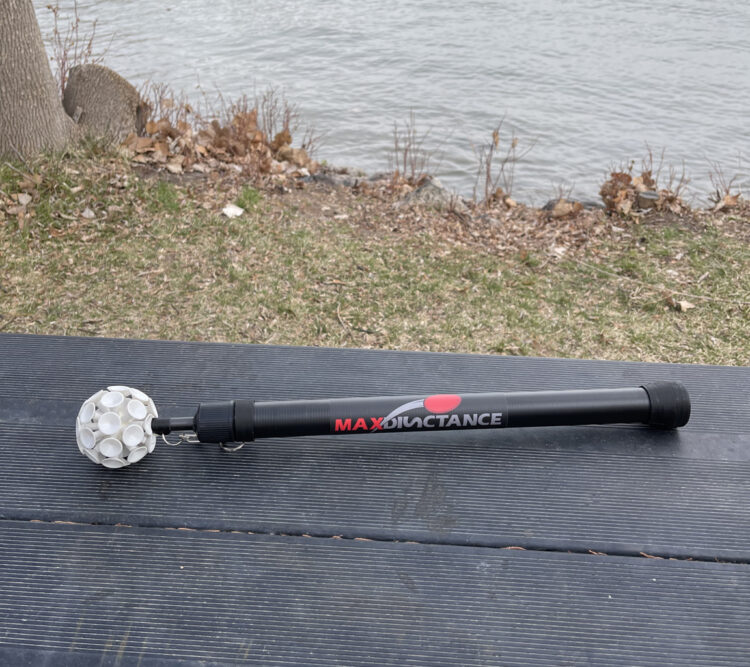
Pole or extension devices
An obvious benefit to having an extension devices is that you can reach discs that you wouldn’t normally be able to reach. The poles come in a variety of sizes, from compact 6-foot poles to massive 20-foot poles. The smaller ones are lighter and take up less room, but limit the distance you can reach. Poles have different tips that can be used for different purposes. These retrievers can reach and retrieve discs that would be impossible for rope-type retrievers.
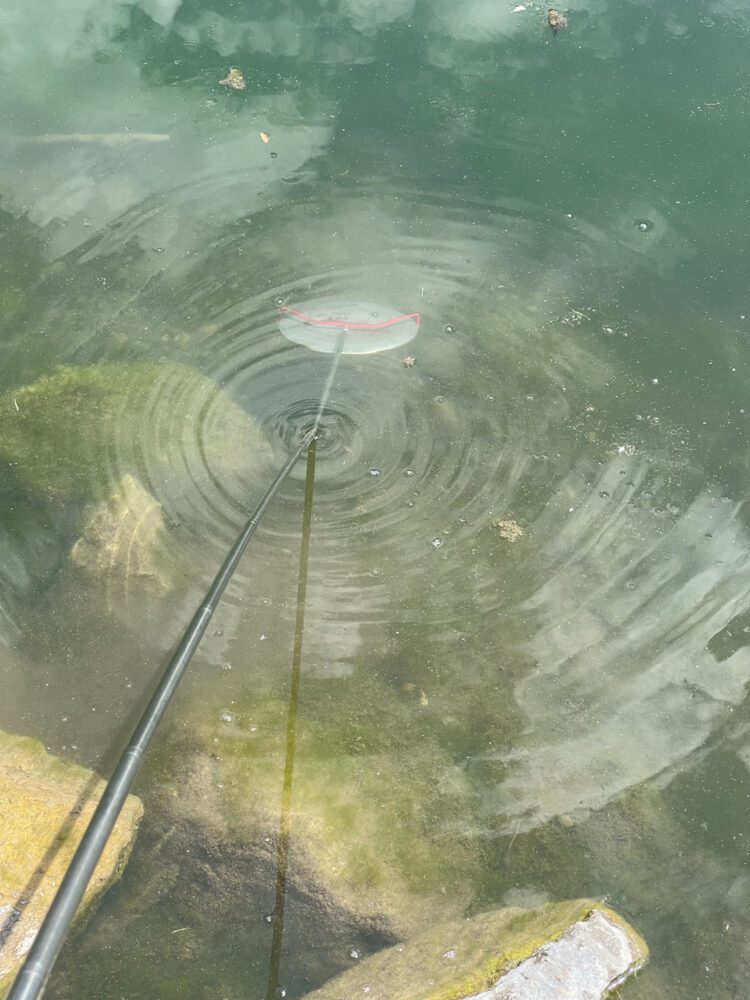 One of the drawbacks of having a telescopic pole is their use in water. Although they can successfully be used to retrieve a disc in a river or pond, they are sometimes difficult to control and can only serve to dislodge the disc, but not bring it to shore. The success of the retrieval depends on the body of water and the tip of the retriever. They can’t reach a disc that lies beyond their max extension. Plus, they can end up with water inside them, which might leak out into your bag or cause corrosion. It is also possible to break a pole if too much force is exerted.
One of the drawbacks of having a telescopic pole is their use in water. Although they can successfully be used to retrieve a disc in a river or pond, they are sometimes difficult to control and can only serve to dislodge the disc, but not bring it to shore. The success of the retrieval depends on the body of water and the tip of the retriever. They can’t reach a disc that lies beyond their max extension. Plus, they can end up with water inside them, which might leak out into your bag or cause corrosion. It is also possible to break a pole if too much force is exerted.
The device on the end of the pole affect the success of the retrieval.
- The suction cup works amazing in water. Preferably standing water, but it can also be used in rivers with a varying degree of success.
- Hooks are useful in trees and can also be used to scoot your disc toward the shore when retrieving in water. They are a good universal tip.
- Metal loops are great for securing the disc to the retriever, but they can be cumbersome in trees. In moving water it might be difficult to ‘catch’ the disc.
Rope Retriever Devices
One of the best reasons to have a rope device is because you can reach a lot further with them than a 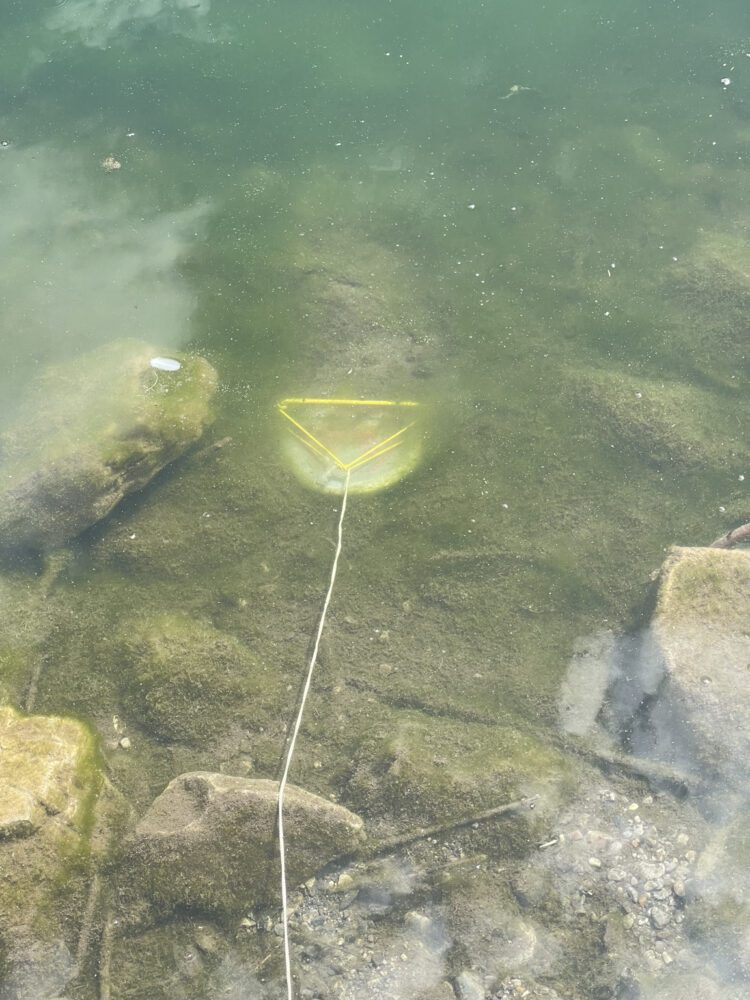 pole. If your disc is in water beyond the reach of your pole, you would be out of luck unless you had a rope retriever such as a Disc Claw or Golden Retriever.
pole. If your disc is in water beyond the reach of your pole, you would be out of luck unless you had a rope retriever such as a Disc Claw or Golden Retriever.
This would be a good time for some pro tips that I’ve learned by having a rope-type retriever. The two issues that I recommend that owners correct are considered cons, but can easily be remedied.
First, get an additional length of paracord to attach to the end of the rope that comes with the retriever. It will greatly extend the distance that you can reach your disc. The length of rope that comes with the retriever device is not as long as you might need. Just make sure you tie a good knot so the retriever doesn’t end up permanently in the water.
Second tip, get a separate object to wrap the rope around besides the retriever itself, so you can just unwind the amount of rope that you need to reach the disc, instead of keeping the rope around the retriever and having to unwind the entire length of rope. I use a landscape string reel to hold my excess retriever cord. Take care of those two issues and you’ll eliminate some of the cons of the device.
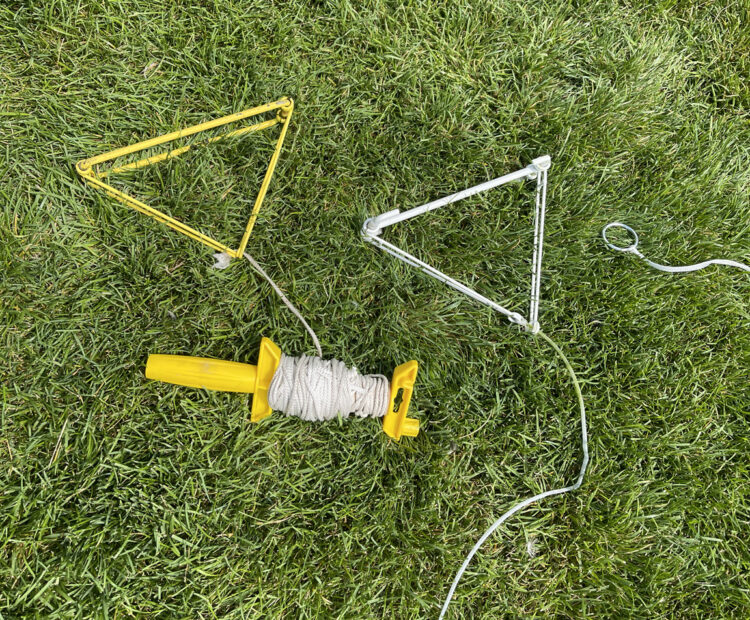
There are a couple of other areas where the rope-retrievers fall short. First, it is mainly just used for water retrievals. You could use it on grass or ice, but it is designed for water use. Is your disc in a tree? This type of disc will likely not be the one you’ll need.
The second issue you might have is that the retriever isn’t as effective if the disc is on rocks. You need to be able to slide over the disc and ‘catch’ it in the retriever. If there are rocks in the way, you might be out of luck.
Best Disc Retriever Winners
With those pros and cons for each retriever in mind, let’s look at your best retriever options.
Best Pole Extension Disc Retriever
Max Stick
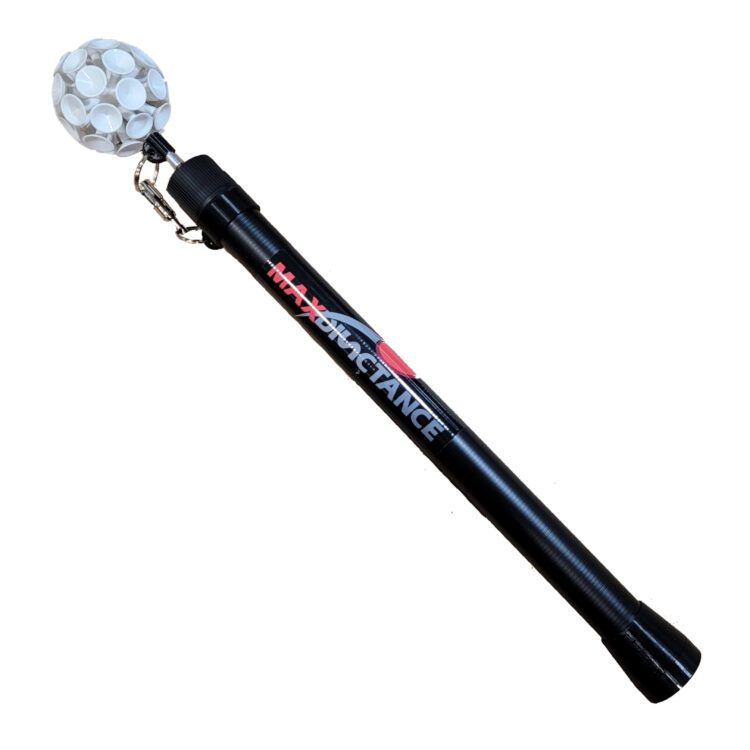
The first time I used a Max Stick suction cup retriever, I loved how it performed. I had a disc in a river and the Max Stick had no problem holding on to my disc and lifting it out of the water. I’ve retrieved several discs from pond as well. While the suction cups shine in water, using the retriever in trees is hit and miss. Getting the ball to stick to your disc can be challenging. And maneuvering your disc through the branches doesn’t always work. That is especially true in bushes, where the disc can become unstuck and fall to a place where you don’t have room to stick the suction cups to the disc.
I think the ideal retriever would be the suction cups with a retractable or detachable hook. That would be the best of both worlds. Even so, the Max Stick is great in water and pretty good in trees. It comes in several different pole sizes, including a massive 29-foot model. You also have the option of buying the suction cup head to screw on to your existing retriever. Check out this popular retriever in the link below
Best Rope Retriever Winner

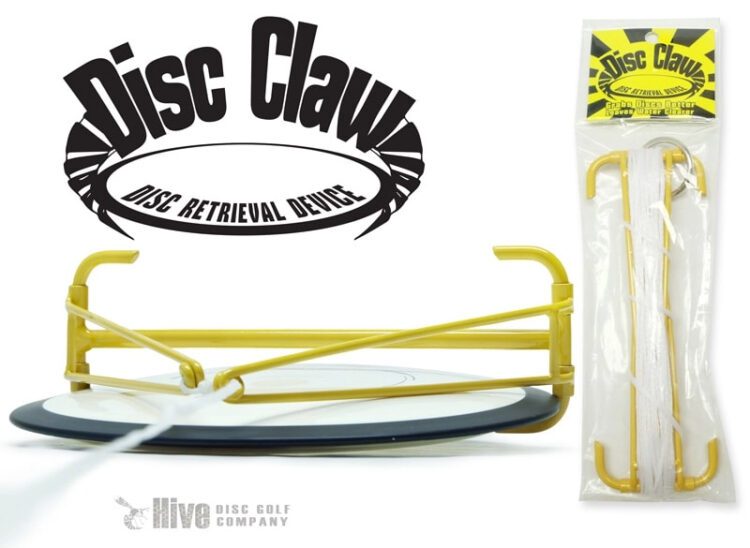
The Disc Claw and the Golden Retriever are both excellent choices for ponds that don’t have large rocks or branches. The enemies of either of those retrievers are rocks and branches, which can make a disc irretrievable and could possibly snag the retriever. If the pond has silt, sand, mud, or moss and you stand a good chance of getting your disc back. As mentioned above, extra rope and a something besides the retriever itself to wrap the rope around will make owning either of these a better option.
Winner? I’m going to call this a tie. The Claw had a few more snags on rocks that the Golden Retriever. However, as the Claw advertises, it kicks up less silt than the Golden Retriever. That keeps your disc visible for more attempts at retrieving it, should that be necessary. Plus, the Claw is a couple bucks cheaper.
Honorable Mentions
Wrist Rocket – Best Retriever for High Trees
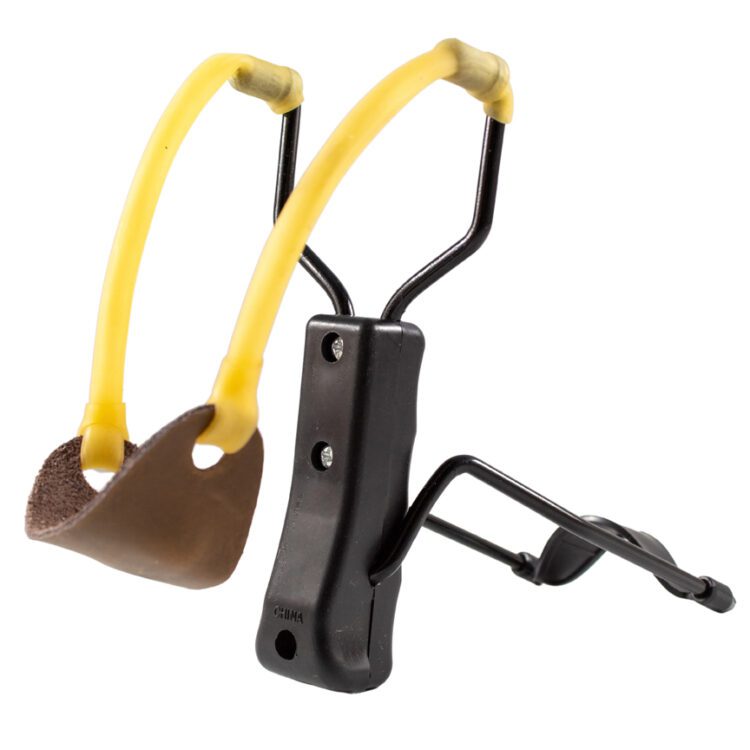
I had heard that people have used wrist rockets to retrieve discs from trees, so I finally bought one to carry around. The first time I had a disc that was beyond the reach of my retriever, I broke out the sling shot and knocked it down after just a few tries. Just last weekend a group of us were able to get four discs out of a tree at a local tournament (although it did take quite a while and numerous attempts). They don’t take up much space and can be another option when the pole retriever can’t reach.
Driver Diver
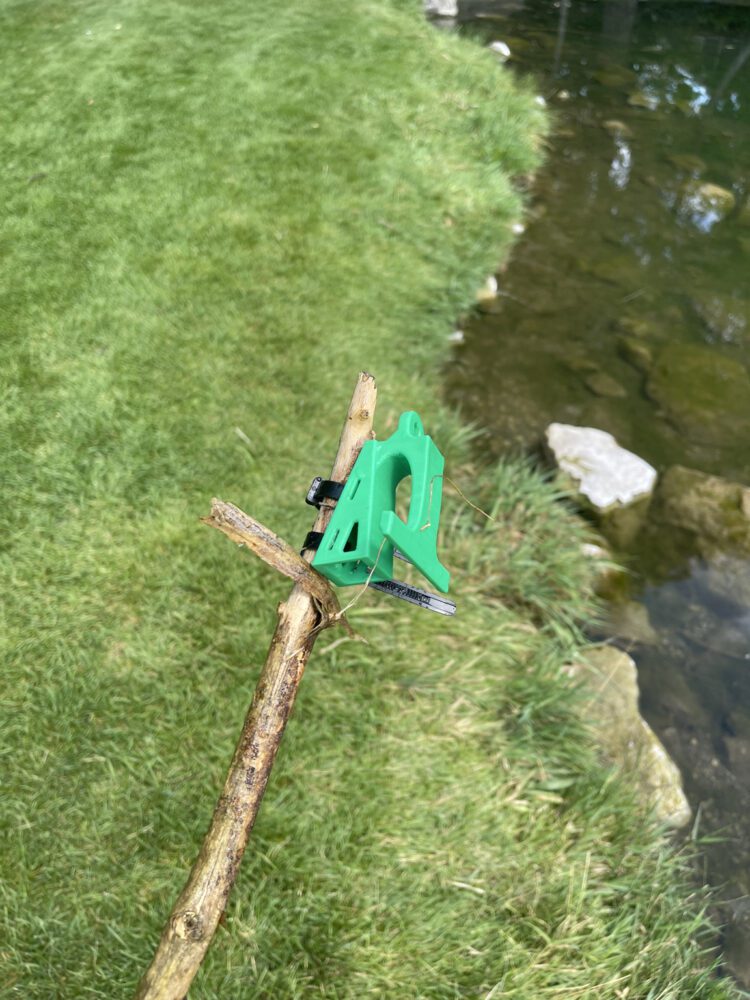
This little piece of plastic is a handy device that doesn’t take up much space. You attach the gadget to a stick with reusable zip ties and the stick becomes your retriever. Perfect for courses with a few smaller bodies of water and trees. Hang it from your bag until needed. Make sure you don’t leave it in a hot car, because it can warp. Mine did, so I took a heat gun to it and that fixed the warp.
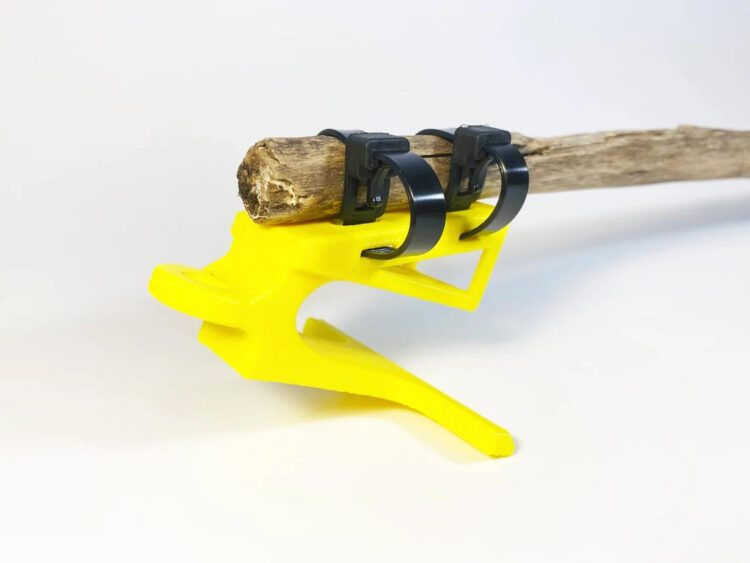
Conclusion
There isn’t one retriever that is best for every situation. But you can still minimize the chances of not being able to retrieve your disc by getting a couple different types. Although I carry an extendable retriever with me at all times, I also usually have a wrist rocket with me. If I’m using a cart and there are water hazards, I’ll also take along a Golden Retriever. If I’m not using a cart, I’ll leave the Golden in my car and get the disc later if needed. It’s worth the effort and increases my chances of going home with all my discs.
Check out our entire retriever inventory here.

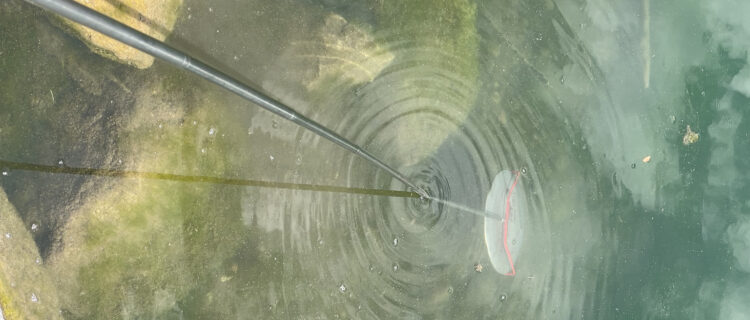
I have an m retriever, which works pretty well. It can extend to a substantial distance.